- Home
- Patrick O'Brian
The Catalans Page 11
The Catalans Read online
Page 11
The decision wavered, however, when he stood outside the door: it was really too gross to burst in like that. And as he stood, hesitating before going away, the door opened, and Xavier was there, looking unnaturally tall with the light behind him.
“Ah, there you are, Alain,” he said. “I was about to come—I should like you to meet Madeleine.”
There was the triangle; Xavier at the apex, Madeleine on his left at the bottom of the room, Alain on his right still by the door; and the lines of consciousness and regard made the three busy sides of the figure. Xavier was the most self-possessed; precise, cold-showered, well-shaved; and he was in his own room. But even Xavier was in some degree of flurry, and there was a hint of color in his gray face, a certain empressement in his movements that showed he was not entirely at his ease. Alain, confused by having the door suddenly opened on him, felt as uncomfortable as if he had been found listening at the keyhole. This was not the girl he had seen in the town some time ago, but another, and far, far prettier; she was perhaps the prettiest creature he had ever seen, for a European, and now that she was standing up at her desk, a little awkwardly because of the nearness of her chair to the desk, and a little awkwardly because she was not sure whether she should stand up, a blush mounted in her cheeks: she looked so agreeable, so very agreeable, that Alain smiled with pleasure, and when they shook hands he said, with unwonted cordiality, that it was a long time since he had seen her. It was an inept remark, so far as the words were concerned, and untrue in suggestion, but it conveyed, and it was meant to convey, civility, kindliness, and even approbation.
For a moment nobody said anything more, and in the silence Alain regretted his bristly face: his unshaved jaw rasped under his hand. Then Xavier said that Madeleine was very kindly finishing the report on Aspullabalitris’ vineyard; she was now on the last page, and from what was already done Alain would be able to judge the effect of the new culture. He passed the sheets to Alain and said, “I thought you would like to see this before we go up there.”
“Yes, indeed,” said Alain, sitting down. “Thank you very much.” He glanced down the column of figures, but he could hardly bring his attention to bear, and before he had grasped even their general significance Xavier spoke again. He was standing behind Madeleine as she finished her page, and he said, “I really do not know how we managed with these tabulated accounts before Madeleine was kind enough to come and help us out.” As he spoke he put his hand on her shoulder, and Alain saw the embarrassed smile on her face turn to something a little more forced, a smile still, held by politeness, but more artificial now and forced; and he saw her shoulder give to avoid the contact. It moved only enough to hint at the gesture of withdrawal before she held it still, but even that very small movement was enough to put an unnaturalness into the poise of her body, and now she had an air of constraint, almost of fixed rigidity.
Alain looked at Xavier, but there seemed to be no awareness on his face: no, he went on talking about the benefits of office machinery, with an animated, unusually cheerful expression; and apparently without thinking about it he left his hand there.
“I thought,” said Xavier, when the typing was done, “I thought that we would have our lunch up at Puig d’en Calbo. We will walk up by the chapel and Aspullabalitris will bring the basket up by the road in his cart.”
If the girl—it was difficult to think of her as a married woman—had not been there Alain would have protested: it was a long way to the Puig d’en Calbo, a very long way and a steep and dusty way. But he weakly agreed, with the proviso that he must be allowed time to fulfill his promise to visit Aunt Margot, and after a few haphazard remarks they parted, Xavier to the kitchen and Alain to his room for his shoes.
“So that is how it is,” he said, sitting on the edge of his bed, holding a shoe in his hand. “So that is how it is.”
“Or is it?” putting on his second shoe and standing up.
“GOOD MORNING, ALAIN,” she said, kissing him on both cheeks; then “Dear me, you look very poorly, Alain; are you quite well? I could make you a tisane in no time at all. I am sure a nice tisane would do you good.”
“No, no, I am quite well, thank you very much. I did not get any sleep last night, that’s all.”
“Oh, Alain, I hope you did not go to those dreadful creatures in Port-Vendres?” Once, long ago, Alain’s youthful curiosity had taken him to the bawdyhouse there, and he had been seen coming out by his Uncle Gaston, Aunt Margot’s late husband.
“No,” he answered seriously. “Xavier and I sat up in the garden, talking. You know, Aunt Margot, we have no earthly right to interfere; not the least right in the world.”
“Come and sit down, and tell me all about it. I am longing to know what he said.”
“Well, I am afraid I cannot tell you all that: in the first place it would take hours and hours, and in the second it was not talk that one could decently pass on.”
“I see. But come into the morning room anyway, and I will make us a pot of coffee. You would like some coffee, wouldn’t you, Alain?”
She had led the way into the quiet, sunny room; she had made the coffee herself, and now the empty cups were cold on the little table.
“. . . so you see, I cannot range myself on the family’s side against him,” said Alain. “I told you, did I not, that I should probably turn out a disappointing ally?”
“Oh, do not say that; you are not disappointing at all. But how he must have suffered, poor fellow: he must have suffered dreadfully.”
“I am afraid he must.”
“He should have gone to Father Aurillac. I wonder why he did not go to Father Aurillac.” She reflected for some minutes and then said, “Alain, you will probably think me an unfeeling old woman, but don’t you think, as a friend, you ought to advise him to take a blue pill and keep to a low diet? Then some mineral waters like Evian or Boulou for the liver?”
“Oh,” said Alain, a little staggered, “that is a very dampening view of it.” He turned it over in his mind, and said, “But it is wonderful what a pill will do, I must admit. Wonderful and disheartening, the link between one’s liver and one’s mind.”
“Why disheartening?”
“Because one likes to think of oneself as a free agent.”
“I am sure, Alain, that all the oil in the cooking down here, and the heavy red wine, is what makes the people so violent, miserable, and irreligious. Have you never noticed that churchgoing and white wine or cider and cooking in butter go together?”
“Well, if he ever consults me, I will tell him what you say. But seriously, Aunt Margot, that is not all that is wrong with Xavier. I wish I were better at conveying the feeling of a conversation: if I had managed to convey even a tenth of the profound sincerity—the shocking . . .” His voice died away.
“No. I am sure that that is not all that is wrong. Oh, I would not suggest that for a moment; though I have no doubt that it has more to do with it than some people might imagine.”
“Aunt Margot, if you had heard Xavier last night, as I heard him, you would not speak lightly about it.”
“Oh Alain, how can you be so unkind? I was not speaking lightly: I just said that—but I will not say any more about it, if it angers you.”
There was a short silence, and she said, “But seriously, and very seriously, Alain, I am deeply sorry for Xavier, very deeply sorry for him indeed. I understand something of what he is suffering from, I think. I knew his father and his grandfather.” She hesitated, patted Alain on the knee, and said, “I do not include you, my dear, when I say that the Roiges are a hard, unaffectionate family; but they are, indeed, and sometimes, living among them, I wonder whether I have grown like them. I do not say that they have not all kinds of virtues: but they are not an affectionate family. Xavier’s grandfather was my father-in-law, of course, and I knew him very well: he was a tyrant. Your Uncle Gaston went in fear of him to the end of his life. He was a very able man, no one could deny it, but he had a wicked, wicked temper, and everyo
ne in the family knew it. Gaston used to tell me stories about their life as children—so hard and bullying and domineering: no love in the house at all, it seemed. You know how much brutal authority a peasant has over his family. It must have been very much like that, only the little peasant children escape quite soon: here in Saint-Féliu with old Monsieur Roig mayor and deputy there was nowhere for them to escape, and he held on to them all to the end of his days. He used to badger his eldest son worst, and I remember dreadful scenes even when Hercule was a gray-haired man.
“And then I saw the whole thing repeated again with Hercule and Xavier. There seemed to be no tenderness in Hercule, none at all. He was quite unloving, at least as far as his son was concerned: but he would not leave him alone, whatever the boy did. It is a dreadful thing to say, but I think it was as good a day for Xavier when his father died as it had been for Hercule when his father died.
“And then it was the same with Dédé. Xavier was easily the most intelligent of the three, you could see that very early; but he has made a worse mess of his son than either his father or his grandfather did. He had the poorest of material to work upon, it is true: but it was pitiable to see the poor, wretched little boy . . . Oh it is miserable to think of it, Alain, generation after generation of unhappiness. Old M. Roig was an unhappy, discontented old man, and Hercule, except when he was in court or at some political meeting, was sour, bitter, harsh, and overbearing: I do not think that either of them knew why they were miserable, but Xavier is more intelligent. Yet he has no more sense than to think it can be cured by marrying this girl.
“Poor Xavier. Poor fellow. I am sure that that is what it means in the Bible when it says ‘suffering for the sins of your fathers.’ And I am sure that you must be loving, not only to save your soul, but to avoid entailing misery on the generations—how many generations?”
They sat quietly together, each thinking a great way off. Alain had in his mind the accusation against his family: it was true, he reflected, they were an unaffectionate lot. They hung together, they were fiercely clannish; they were loyal; but they were unaffectionate. There was very little tenderness in their lives: they admired efficiency and success: but they were unaffectionate. Côme and Renée, Aunt Ursule and Uncle Gaudérique after all these years, Aunt Marinette, Yvonne and her children: there was that peasant hardness remaining, running through the generations. The word “unaffectionate” haunted him, and he wondered how much it applied to himself. He had a fair number of friends, but did he really care whether he saw any of them again? And his family? With Xavier, for example, was his feeling of concern and disquiet caused by affection? No: probably it was not. There was, even now, something repellent about Xavier: or if repellent were too strong a word, at least something that prevented the closeness of friendship.
There was Aunt Margot, of course: he was certainly very fond of her; and Martin in Hanoi. But the others . . .
“These sort of marriages never work,” said Aunt Margot,
suddenly.
“Why not?”
“Haven’t you always seen that they never work?”
“I cannot say that I have. I do not remember ever having seen one.”
“Of course, you see very little of life, living there at the back of beyond. Sometimes, Alain—you must not be cross—it is almost like talking to a girl straight from the convent. You have been shut away there among your black men, and you have the same romantic ideas and ignorance of the world. But you have seen a European marry a native, have you not?”
“Yes.”
“Then I have no doubt the same thing happens. A few weeks of bliss, then the native family starts presuming, the other Europeans’ unkindness begins to be felt, and eventually there are coffee-colored children, neither one thing nor another, and everybody is miserable.”
“Oh but come, Aunt Margot, there is no parallel at all. You talk as if we were Bourbons or Hapsburgs or something very grand. But you know that we are only middling bourgeois: in fact this is the first generation to suspect that the word bourgeois is perhaps something less than a compliment. The Fajals are not perceptibly different from us in any way, and . . .”
“Oh, you are not going to start your piece on democracy again, are you, Alain? Of course, I know one has to say all kinds of fine things in public, but no one really believes it, do they? Except the lower classes. They are very good people, often, astonishingly good when you consider what kind of lives they lead, but it is just hypocritical nonsense to pretend that they are not brutish, insensitive, gross, and terribly, terribly limited. There is just as much difference between a man of an educated family that has had money for two or three generations and a laborer as there is between a white man and one of your Hottentots, as anyone knows who has lived or worked among them.”
“Is Madeleine a Hottentot?”
“No. But her relations are: and staying here, Xavier would of necessity marry them all. Then think of this, Alain: whatever he may say Xavier values his position very much. A man of his intelligence does not slave away day and night to build up something without valuing it. It will crumble away. You must see that it will. And then he will blame the girl.”
“Well, if that is all your objection—”
“But it is not, Alain. If it were, it would just be a dreadful mésalliance and that would be all, but the point is that Xavier does not really want to marry her at all, not marry her. He must know that it is madness, at the back of his mind. It is perfectly natural for any middle-aged man to want a very good-looking young woman, and if he is a good man he can easily make himself believe that it is not the young woman he wants at all, but some much grander kind of thing. With Xavier it is this plan of marriage and affection: with my own dear Gaston it was what he called escape from the stifling fetters (or was it mattress?) of provincial life; and with a man I knew long ago—such an attractive man—it was the necessity of a wider, deeper, more poetic experience of life. Then there was the poor archdeacon, you remember, who had worked it all out as a kind of mystical duty—part of a great scheme of love and forgiveness. They had to hurry him away to a monastery.”
Alain was already standing up. “You must forgive me, my dear aunt,” he said, “but I have an appointment with Xavier in three minutes, and you know what he is like if one is late.”
“You will have to run, Alain. Where is your hat? You did not come without a hat? You are dreadfully imprudent, Alain. You should have two or three wives to look after you, like a Monsoon. Here, take this one. It was Gaston’s. You must protect your head from the sun.”
THE ROAD WAS LONG, of course: it always had been long, but never had it been quite so long, so excessively, unnecessarily long. Their way was the path that led out from the town along the dried-up river-bed; sometimes it was the river-bed itself, rough with loose and shifting stones, paved with old tins and cardboard boxes, and sometimes it was a narrow path by the side.
Why did people bring buckets here, buckets with no bottoms? And while kittens certainly had to be destroyed, who in Saint-Féliu was so eccentric as to bring their corpses up the river-bed a quarter of a mile from the town? It was not a solitary eccentric, either: there must be at least three. The single espadrille. France was littered with single espadrilles, shoes, boots, sandals; occasionally you would find pairs. But in either case they were always a great way from the nearest village or farm, and always they evoked the image of a man hobbling back from some strangely inaccessible point, partially or wholly barefoot. Yet one never met these people. Umbrellas; broken glass; something from which Alain quickly averted his eyes; an iron bedstead; a hat. Some curs from the village, reveling.
This is a fine walk, he thought, looking resentfully at Xavier’s straight back; a fine walk, with the putrid dust rising in clouds from their feet.
Xavier was saying how incomprehensible people were: they had a regular collection of rubbish; there were laws to forbid them encumbering the earth with their ordures; yet still they came far out of the town and threw
their dirt abroad: it was inconsiderate, undesirable, and above all grossly unhygienic. He delivered these remarks over his shoulder to Alain, and Alain, though he agreed with them all, could not but feel suddenly and strongly on the side of individual liberty, the right of behaving like a mandrill if one chose. He said, in a dogmatic and authoritative voice, that the sun was a better disinfector than anything known to man, and that the danger from this kind of thing was much exaggerated.
He trod on the edge of an iron barrel-hoop; it shot up and struck him on the shin. The blow was exquisitely painful, but that was the least: he whipped up his torn trouser-leg, thinking with hurried alarm of the rusty metal edge and the couch of filth where it had lain. One might have supposed the direct and timely intervention of a minor god. But although the cloth was torn the skin was not: it had been a warning, not a punishment.
Xavier had not noticed at first that Alain was no longer with him, but now he stopped and stood waiting.
“You should look where you are going,” he said, as Alain came up. “Did you hurt yourself?”
“No.”
“You are limping.”
“No I am not.”
Xavier raised his eyebrows, and they went on in silence. The road mounted from the river-bed: it was now a broad path running along the edge of an olive grove, and now the last of the rubbish was left behind. Alain began to feel ashamed of his ill-temper and he tried to think of something conciliating to say. They were walking along the best part of the valley now: on their left hand were the olives, an ancient grove on a light fawn ground of withered grass and naked earth, black, rent, and knotted trunks under a cloud of green and silver; and on their right the stream, running low, unseen but audible among the deep green. On either side the walls of the valley ran up in long tiers, one after another, without a single break of scrub or uncultivated land: it was all a dark green now—no earth to be seen between the vines—except that near at hand the gold and red and purple of the grapes showed clear between the leaves.

 The Final Unfinished Voyage of Jack Aubrey
The Final Unfinished Voyage of Jack Aubrey The Rendezvous and Other Stories
The Rendezvous and Other Stories Caesar: The Life Story of a Panda-Leopard
Caesar: The Life Story of a Panda-Leopard The Hundred Days
The Hundred Days The Yellow Admiral
The Yellow Admiral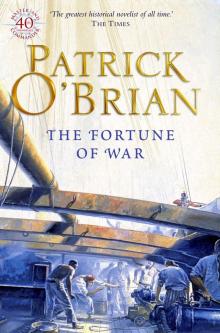 The Fortune of War
The Fortune of War The Mauritius Command
The Mauritius Command Beasts Royal: Twelve Tales of Adventure
Beasts Royal: Twelve Tales of Adventure A Book of Voyages
A Book of Voyages The Surgeon's Mate
The Surgeon's Mate The Golden Ocean
The Golden Ocean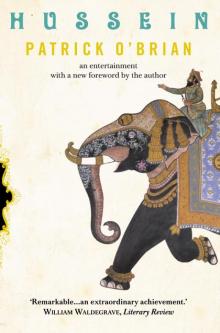 Hussein: An Entertainment
Hussein: An Entertainment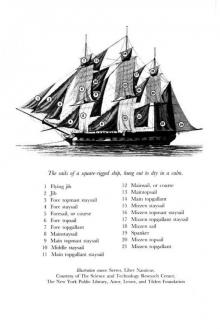 H.M.S. Surprise
H.M.S. Surprise The Far Side of the World
The Far Side of the World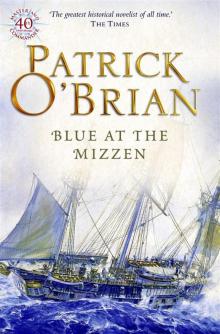 Blue at the Mizzen
Blue at the Mizzen The Unknown Shore
The Unknown Shore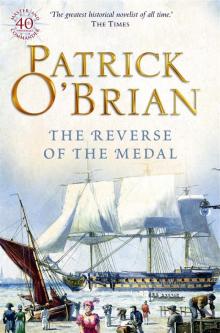 The Reverse of the Medal
The Reverse of the Medal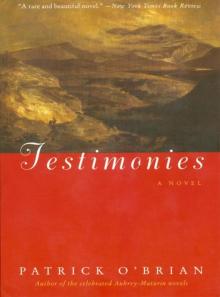 Testimonies
Testimonies Master and Commander
Master and Commander The Letter of Marque
The Letter of Marque Treason's Harbour
Treason's Harbour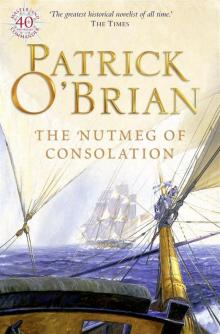 The Nutmeg of Consolation
The Nutmeg of Consolation 21: The Final Unfinished Voyage of Jack Aubrey
21: The Final Unfinished Voyage of Jack Aubrey The Thirteen-Gun Salute
The Thirteen-Gun Salute The Ionian Mission
The Ionian Mission Men-of-War
Men-of-War The Commodore
The Commodore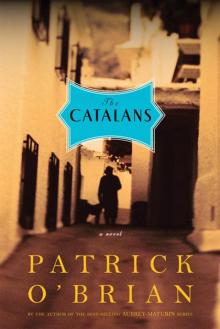 The Catalans
The Catalans Aub-Mat 08 - The Ionian Mission
Aub-Mat 08 - The Ionian Mission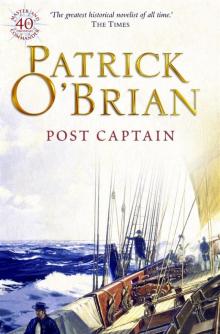 Post Captain
Post Captain The Road to Samarcand
The Road to Samarcand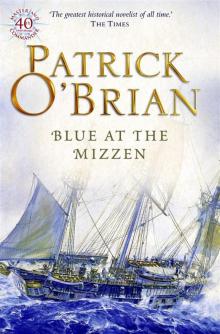 Book 20 - Blue At The Mizzen
Book 20 - Blue At The Mizzen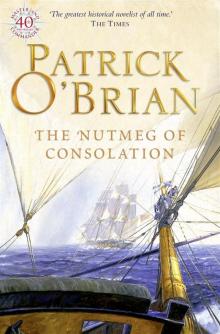 Book 14 - The Nutmeg Of Consolation
Book 14 - The Nutmeg Of Consolation Caesar
Caesar The Wine-Dark Sea
The Wine-Dark Sea Book 8 - The Ionian Mission
Book 8 - The Ionian Mission Book 12 - The Letter of Marque
Book 12 - The Letter of Marque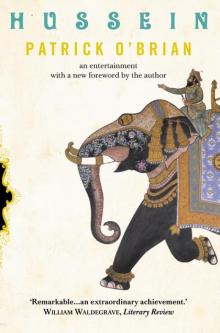 Hussein
Hussein Book 9 - Treason's Harbour
Book 9 - Treason's Harbour Book 19 - The Hundred Days
Book 19 - The Hundred Days Master & Commander a-1
Master & Commander a-1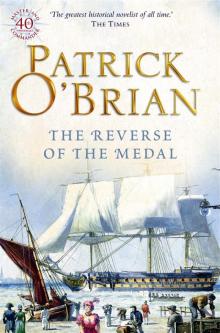 Book 11 - The Reverse Of The Medal
Book 11 - The Reverse Of The Medal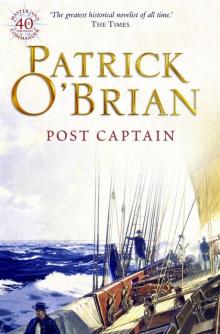 Book 2 - Post Captain
Book 2 - Post Captain The Truelove
The Truelove The Thirteen Gun Salute
The Thirteen Gun Salute Book 17 - The Commodore
Book 17 - The Commodore The Final, Unfinished Voyage of Jack Aubrey
The Final, Unfinished Voyage of Jack Aubrey Book 10 - The Far Side Of The World
Book 10 - The Far Side Of The World Book 5 - Desolation Island
Book 5 - Desolation Island Beasts Royal
Beasts Royal Book 18 - The Yellow Admiral
Book 18 - The Yellow Admiral Book 15 - Clarissa Oakes
Book 15 - Clarissa Oakes Book 7 - The Surgeon's Mate
Book 7 - The Surgeon's Mate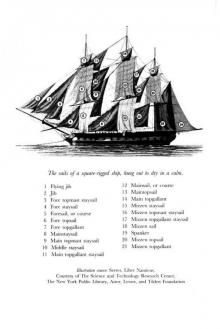 Book 3 - H.M.S. Surprise
Book 3 - H.M.S. Surprise Desolation island
Desolation island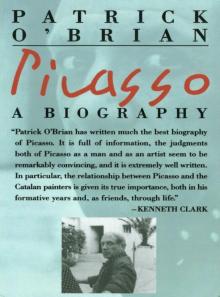 Picasso: A Biography
Picasso: A Biography Book 4 - The Mauritius Command
Book 4 - The Mauritius Command Book 1 - Master & Commander
Book 1 - Master & Commander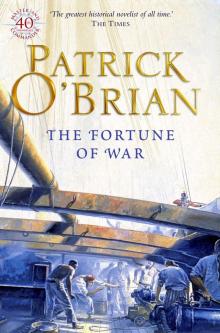 Book 6 - The Fortune Of War
Book 6 - The Fortune Of War Book 13 - The Thirteen-Gun Salute
Book 13 - The Thirteen-Gun Salute Book 16 - The Wine-Dark Sea
Book 16 - The Wine-Dark Sea